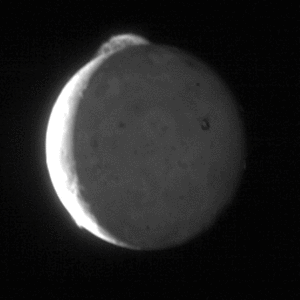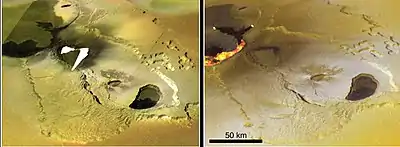Tvashtar Paterae

Tvashtar Paterae compose an active volcanic region of Jupiter's moon Io located near its north pole. It is a series of paterae, or volcanic craters. It is named after Tvashtar, the Hindu god of blacksmiths.[1] Tvashtar was discovered in IRTF images in November 26 1999, several hours after a Galileo flyby. Images taken with the ESO 3.6m telescope and its adaptive optics in September 1999 revealed the presence of faint hot spot (labeled 990930D). The outburst was studied by the Galileo spacecraft over several years. During this time, a 25-kilometre (16 mi) long, 1-to-2-kilometre (0.62 to 1.24 mi) high curtain of lava was seen to erupt from one patera, a lake of superheated silicate lava erupted in the largest patera, and finally a plume of gas burst out, rising 385 kilometres (239 mi) above Io and blanketing areas as far away as 700 kilometres (430 mi).[2]
The hot spot awakening of Tvashtar was observed on 02 June 2006 with the Keck Adaptive Optics system and followed up for 530 days making it the longest outburst eruption ever observed on Io. On February 26, 2007 the eruption was photographed by the New Horizons probe as it went past Jupiter en route to Pluto. The probe observed an enormous 330-kilometre (210 mi) high plume from the volcano, with an as-yet unexplained filamentary structure made clearly visible by the background light from the sun.[3]
References
- "Tvashtar Paterae". Gazetteer of Planetary Nomenclature. International Astronomical Union (IAU) Working Group for Planetary System Nomenclature (WGPSN). 2006-10-01. Archived from the original on 2012-12-14. Retrieved 2013-12-14.
- "University of Arizona Planetary Image Research Laboratory May 28, 2002 Report on Tvashtar Paterae". Archived from the original on May 3, 2006. Retrieved July 20, 2006.
- Mission Photos: An Eruption on Io (New Horizons) Retrieved on February 28, 2007.
External links
 Media related to Tvashtar Paterae at Wikimedia Commons
Media related to Tvashtar Paterae at Wikimedia Commons- "VOLCANIC ACTIVITY AT TVASHTAR CATENA, IO", Lunar and Planetary Science XXXV (2004)

